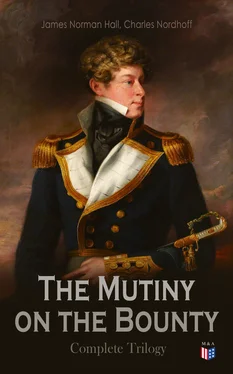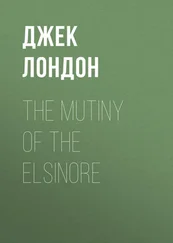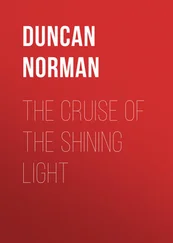“Come aft, Mr. Young!” he called harshly. “I’m going to teach you to attend to your duty, instead of skylarking about the woods. Mr. Morrison!”
“Yes, sir!”
“Come aft here and seize up Mr. Young on that gun yonder! You’re to give him a dozen with a rope’s end.”
Young was an officer of the ship and rated as a gentleman, a proud, fearless man of gentle birth. Though Bligh was within his powers as captain, the public flogging of such a man was almost without precedent in the Service. Morrison’s jaw dropped at the order, which he obeyed with such evidence of reluctance that Bligh shouted at him threateningly, “Look alive, Mr. Morrison! I’ve my eye on you!”
I shall not speak of the flogging of Young, nor tell how Skinner’s back was cut to ribbons with two dozen at the gangway. It is enough to say that Young was a different man from that day on, performing his duties sullenly and in silence, and avoiding the other midshipmen in the berth. He informed me long afterwards that, had events turned out differently, it was his intention to resign from the Service on the ship’s arrival in England, and call Bligh to account as man to man.
On the fourth of September, with a fine spanking breeze at northwest, we weighed anchor and sailed out of Adventure Bay. Seven weeks later, after an uneventful passage made miserable by an outbreak of scurvy and the constant state of starvation to which we were reduced, I saw my first South Sea island.
We had gotten our easting in the high southern latitudes, and once in the trade winds we made a long board to the north on the starboard tack. We were well into the tropics now and in the vicinity of land. Man-of-war hawks hovered overhead, their long forked tails opening and shutting like scissor-blades; shoals of flying fish rose under the ship’s cutwater to skim away and plunge into the sea like whiffs of grapeshot. The sea was of the pale turquoise blue only to be seen within the tropics, shading to purple here and there where clouds obscured the sun. The roll of the Pacific from east to west was broken by the labyrinth of low coral islands to the east of us,—the vast cluster of half-drowned lands called by the natives Paumotu,—and the Bounty sailed a tranquil sea.
I was off watch that afternoon and engaged in sorting over the articles I had laid in, at the suggestion of Sir Joseph Banks, for barter with the Indians of Tahiti. Nails, files, and fishhooks were in great demand, as well as bits of cheap jewelry for the women and girls. My mother had given me fifty pounds for the purchase of these things, and Sir Joseph had added another fifty to it, advising me that liberality to the Indians would be amply repaid. “Never forget,” he had remarked, “that in the South Sea the Seven Deadly Sins are compounded into one, and that one is meanness.” I had taken this advice to heart, and now, as I looked over my store of gifts, I felt satisfied that I had laid out my hundred pounds to good effect. I had been a lover of fishing since childhood, and my hooks were of all sizes and the best that money could buy. My sea chest was half filled with other things—coils of brass wire, cheap rings, bracelets, and necklaces; files, scissors, razors, a variety of looking-glasses, and a dozen engraved portraits of King George, which Sir Joseph had procured for me. And down in one corner of the chest, safe from the prying eyes of my messmates, was a velvet-lined box from Maiden Lane. It contained a bracelet and necklace, curiously wrought in a design like the sinnet seamen plait. I was a romantic lad, not without my dreams of some fair barbarian girl who might bestow her favours on me. As I look back over the long procession of years, I cannot but smile at a boy’s simplicity, but I would give all my hard-earned worldly wisdom to recapture if only for an hour the mood of those days of my youth. I had returned them to my chest when I heard Mr. Bligh’s harsh, vibrant voice. His cabin was scarcely fifteen feet aft of where I sat.
“Mr. Fryer!” he called peremptorily. “Be good enough to step into my cabin.”
“Yes, sir,” replied the master’s voice.
I had no desire to eavesdrop on the conversation that followed, but there was no way to avoid it without leaving my open chest in the berth.
“To-morrow or the day after,” said Bligh, “we shall drop anchor in Matavai Bay. I have had Mr. Samuel make an inventory of the stores on hand, which has enabled him to cast up an account of the provisions expended on the voyage so far. I desire you to glance over this book, which requires your signature.”
A long silence followed, broken at last by Fryer’s voice. “I cannot sign this, sir,” he said.
“Cannot sign it? What do you mean, sir?”
“The clerk is mistaken, Mr. Bligh. No such amounts of beef and pork have been issued!”
“You are wrong!” answered the captain angrily. “I know what was taken aboard and what remains. Mr. Samuel is right!”
“I cannot sign, sir,” said Fryer obstinately.
“And why the devil not? All that the clerk has done was done by my orders. Sign it instantly! Damme! I am not the most patient man in the world.”
“I cannot sign,” insisted Fryer, a note of anger in his voice; “not in conscience, sir!”
“But you can sign,” shouted Bligh in a rage; “and what is more, you shall!” He went stamping up the ladderway and on to the deck. “Mr. Christian!” I heard him shout to the officer of the watch. “Call all hands on deck this instant!”
The order was piped and shouted forward and, when we assembled, the captain, flushed with anger, uncovered and read the Articles of War. Mr. Samuel then came forward with his book and a pen and ink.
“Now, sir!” Bligh ordered the master, “sign this book!”
There was a dead silence while Fryer took up the pen reluctantly.
“Mr. Bligh,” he said, controlling his temper with difficulty, “the ship’s people will bear witness that I sign in obedience to your orders, but please to recollect, sir, that this matter may be reopened later on.”
At that moment a long-drawn shout came from the man in the foretop. “Land ho!”
Table of Contents
The lookout had sighted Mehetia, a small, high island forty miles to the southeast of Tahiti. I stared ahead, half incredulously, at the tiny motionless projection on the horizon line. The wind died away toward sunset and we were all night working up to the land.
I went off watch at eight bells, but could not sleep; an hour later, perched on the fore-topgallant crosstrees, I watched the new day dawn. The beauty of that sunrise seemed ample compensation for all of the hardships suffered during the voyage: a sunrise such as only the seaman knows, and then only in the regions between the tropics, remote from home. Saving the light, fluffy “fair-weather clouds” just above the vast ring of horizon which encircled us, the sky was clear. The stars paled gradually; as the rosy light grew stronger, the velvet of the heavens faded and turned blue. Then the sun, still below the horizon, began to tint the little clouds in the east with every shade of mother-of-pearl.
An hour later we were skirting the reef, before a light air from the south. For the first time in my life I saw the slender, graceful trunk and green fronds of the far-famed coconut tree, the thatched cottages of the South Sea Islanders, set in their shady groves, and the people themselves, numbers of whom walked along the reef not more than a cable’s length away. They waved large pieces of white cloth and shouted what I supposed were invitations to come ashore, though their voices were drowned in the noise of a surf which would have made landing impossible even had Mr. Bligh hove-to and lowered a boat.
Mehetia is high and round in shape, and not more than three miles in its greatest extent. The village is at the southern end, where there is a tolerably flat shelf of land at the base of the mountain, but elsewhere the green cliffs are steep-to, with the sea breaking at their feet. The white line of the breakers, the vivid emerald of the tropical vegetation covering the mountains everywhere, the rich foliage of the breadfruit trees in the little valleys, and the plumed tops of the coconut palms growing in clusters here and there, made up a picture which enchanted me. The island had the air of a little paradise, newly created, all fresh and dewy in the dawn, stocked with everything needful for the comfort and happiness of man.
Читать дальше











